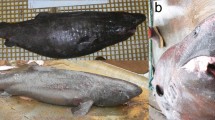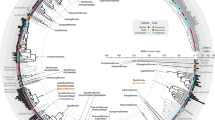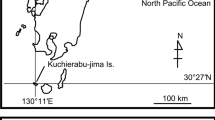Abstract
The larval stage is a critical aspect of the biology of most marine animals, impacting not only the species fitness but also its bathymetric and geographic distribution. To understand the role of larval dispersion and adult characteristics in the distribution of marine gastropods, the present study assesses the relationship among larval development type (planktotrophic, lecithotrophic, or intracapsular metamorphosis), adult characteristics (body size, depth range, and habitat diversity), and geographic distribution of benthic gastropods inhabiting shallow waters (up to 200 m depth) in the Western Atlantic Ocean. Results were generated using literature and linear mixed model (LMM) and variance partition analyses. Larval development type is the most important predictor of geographical distribution of marine gastropods analyzed here, unlike studies with reef fishes. Along with the type of larval development, the ability to occupy different types of habitats and depth ranges were also important to predict the geographic distribution, but to a lesser extent. The similar dispersal capabilities of planktotrophic and lecithotrophic larvae and the restricted geographic distribution of some species with planktonic larvae are also discussed.


Similar content being viewed by others
Data and code availability
All data generated or analyzed during this study are provided in Online Resource 1.
References
Abelson A, Denny M (1997) Settlement of marine organisms in flow. Annu Rev Ecol Syst 28:317–339
Albaina N, Olsen JL, Couceiro L, Ruiz JM, Barreiro R (2012) Recent history of the European Nassarius nitidus (Gastropoda): phylogeographic evidence of glacial refugia and colonization pathways. Mar Biol 159:1871–1884. https://doi.org/10.1007/s00227-012-1975-9
Aliani S, Molcard A (2003) Hitch-hiking on floating marine debris: macrobenthic species in the Western Mediterranean Sea. Hydrobiologia 503:59–67
Andrade SCS, Magalhães CA, Solferini VN (2003) Patterns of genetic variability in Brazilian Littorinids (Mollusca): a macrogeographic approach. J Zool Syst Evol Res 41:249–255
Ávila SP (2006) Oceanic islands, rafting, geographical range and bathymetry: a neglected relationship? Occas Publ Irish Biogeogr Soc 9:22–39
Ávila SP, Melo C, Berning B, Nuno S, Quartau R, Rijsdijk KF, Ramalho RS, Cordeiro R, De Sá NC, Pimentel A, Baptista L, Medeiros A, Gil A, Johnson ME (2019) Towards a ‘Sea-Level Sensitive’ dynamic model: impact of island ontogeny and glacio-eustasy on global patterns of marine island biogeography. Biol Rev 94:1116–1142. https://doi.org/10.1111/brv.12492
Baptista L, Meimberg H, Ávila SP, Santos AM, Curto M (2021a) Dispersal ability, habitat characteristics, and sea-surface circulation shape population structure of Cingula trifasciata (Gastropoda: Rissoidae) in the remote Azores Archipelago. BMC Ecol Evol 21:128. https://doi.org/10.1186/s12862-021-01862-1
Baptista L, Santos AM, Melo CS, Rebelo AC, Madeira P, Cordeiro R, Botelho AZ, Hipólito A, Pombo J, Voelker AHL, Ávila SP (2021b) Untangling the origin of the newcomer Phorcus sauciatus (Mollusca: Gastropoda) in a remote Atlantic archipelago. Mar Biol 168:1–17. https://doi.org/10.1007/s00227-020-03808-5
Barroso CX, Lotufo TMDC, Matthews-Cascon H (2016) Biogeography of Brazilian prosobranch gastropods and their Atlantic relationships. J Biogeogr 43:2477–2488. https://doi.org/10.1111/jbi.12821
Berger EM (1973) Gene-enzyme variation in three sympatric species of Littorina. Biol Bull 145:83–90
Bhaud MR (1993) Relationship between larval type and geographic range in marine species: complementary observations on gastropods. Oceanol Acta 16:191–198
Bird CE, Holland BS, Bowen BW, Toonen RJ (2011) Diversification of sympatric broadcast-spawning limpets (Cellana spp.) within the Hawaiian archipelago. Mol Ecol 20:2128–2141. https://doi.org/10.1111/j.1365-294X.2011.05081.x
Bouchet P (1989) A review of poecilogony in gastropods. J Molluscan Stud 55:67–78
Briggs JC, Bowen BW (2012) A realignment of marine biogeographic provinces with particular reference to fish distributions. J Biogeogr 39:12–30. https://doi.org/10.1111/j.1365-2699.2011.02613.x
Briggs JC, Bowen BW (2013) Marine shelf habitat: biogeography and evolution. J Biogeogr 40:1023–1035. https://doi.org/10.1111/jbi.12082
Brown JH, Stevens GC, Kaufman DM (1996) The geographic range: Size, shape, boundaries, and internal structure. Annu Rev Ecol Syst 27:597–623. https://doi.org/10.1146/annurev.ecolsys.27.1.597
Bürkli A, Wilson AB (2017) Explaining high-diversity death assemblages: Undersampling of the living community, out-of-habitat transport, time-averaging of rare taxa, and local extinction. Palaeogeogr Palaeoclimatol Palaeoecol 466:174–183. https://doi.org/10.1016/j.palaeo.2016.11.022
Cabezas MP, Navarro-Barranco C, Ros M, Guerra-García JM (2013) Long-distance dispersal, low connectivity and molecular evidence of a new cryptic species in the obligate rafter Caprella andreae Mayer, 1890 (Crustacea: Amphipoda: Caprellidae). Helgol Mar Res 67:483–497. https://doi.org/10.1007/s10152-012-0337-9
Cacabelos E, Neto AI, Martins GM (2021) Gastropods with different development modes respond differently to habitat fragmentation. Mar Environ Res 167:105287. https://doi.org/10.1016/j.marenvres.2021.105287
Cadeé GC (2011) Hydrobia as “Jonah in the Whale”: shell repair after passing through the digestive tract of shelducks alive. Palaios 26:245–249. https://doi.org/10.2110/palo.2010.p10-095r
Capinha C, Essl F, Seebens H, Moser D, Pereira HM (2015) The dispersal of alien species redefines biogeography in the Anthropocene. Science 348:1248–1251. https://doi.org/10.1126/science.aaa8913
Carlton JT (2003) Community assembly and historical biogeography in the North Atlantic Ocean: the potential role of human-mediated dispersal vectors. Hydrobiologia 503:1–8. https://doi.org/10.1023/B:HYDR.0000008479.90581.e1
Carrier T, Reitzel A, Heyland A (2018) Evolutionary Ecology of Marine Invertebrate Larvae, 1st edn. Oxford University Press, New York
Castilla JC, Guinez R (2000) Disjoint geographical distribution of intertidal and nearshore benthic invertebrates in the southern hemisphere. Rev Chil Hist Nat 73:585–603. https://doi.org/10.4067/S0716-078X2000000400004
Chan FT, Briski E (2017) An overview of recent research in marine biological invasions. Mar Biol 164:1–10. https://doi.org/10.1007/s00227-017-3155-4
Chapman JW, Carlton JT, Bellinger MR, Blakeslee AMH (2007) Premature refutation of a human-mediated marine species introduction: The case history of the marine snail Littorina littorea in the Northwestern Atlantic. Biol Invasions 9:995–1008. https://doi.org/10.1007/s10530-007-9098-9
Claremont M, Williams ST, Barraclough TG, Reid DG (2011) The geographic scale of speciation in a marine snail with high dispersal potential. J Biogeogr 38:1016–1032. https://doi.org/10.1111/j.1365-2699.2011.02482.x
Collin R (2001) The effects of mode of development on phylogeography and population structure of North Atlantic Crepidula (Gastropoda: Calyptraeidae). Mol Ecol 10:2249–2262. https://doi.org/10.1046/j.1365-294X.2001.01372.x
Collin R (2003) Worldwide patterns in mode of development in calyptraeid gastropods. Mar Ecol Prog Ser 247:103–122. https://doi.org/10.3354/meps247103
Collin R (2005) Development, phylogeny, and taxonomy of Bostrycapulus (Caenogastropoda: Calyptraeidae), an ancient cryptic radiation. Zool J Linn Soc 144:75–101. https://doi.org/10.1111/j.1096-3642.2005.00162.x
Collin R, Rebolledo AP, Smith E, Chan KYK (2021) Thermal tolerance of early development predicts the realized thermal niche in marine ectotherms. Funct Ecol 35:1679–1692. https://doi.org/10.1111/1365-2435.13850
Cowen RK, Sponaugle S (2009) Larval dispersal and marine population connectivity. Ann Rev Mar Sci 1:443–466. https://doi.org/10.1146/annurev.marine.010908.163757
Cowman PF, Bellwood DR (2013) Vicariance across major marine biogeographic barriers: Temporal concordance and the relative intensity of hard versus soft barriers. Proc R Soc B 280:20131541. https://doi.org/10.1098/rspb.2013.1541
Crandall ED, Treml EA, Barber PH (2012) Coalescent and biophysical models of stepping-stone gene flow in neritid snails. Mol Ecol 21:5579–5598. https://doi.org/10.1111/mec.12031
Cumming RA, Nikula R, Spencer HG, Waters JM (2014) Transoceanic genetic similarities of kelp-associated sea slug populations: long-distance dispersal via rafting? J Biogeogr 41:2357–2370. https://doi.org/10.1111/jbi.12376
Cunha TJ, Giribet G (2019) A congruent topology for deep gastropod relationships. Proc R Soc B 286:20182776. https://doi.org/10.1098/rspb.2018.2776
Dahlke FT, Wohlrab S, Butzin M, Pörtner HO (2020) Thermal bottlenecks in the life cycle define climate vulnerability of fish. Science 369:65–70. https://doi.org/10.1126/science.aaz3658
Darling JA, Carlton JT (2018) A framework for understanding marine cosmopolitanism in the Anthropocene. Front Mar Sci 5:293. https://doi.org/10.3389/fmars.2018.00293
Davis M, Bolton CA, Stoner AW (1993) A comparison of larval development, growth, and shell morphology in three Caribbean Strombus species. The Veliger 36:236–244
Dias GM, Duarte LFL, Solferini VN (2006) Low genetic differentiation between isolated populations of the colonial ascidian Symplegma rubra Monniot, C. 1972. Mar Biol 148:807–815
Donald KM, Kennedy M, Spencer HG (2005) Cladogenesis as the result of long-distance rafting events in South Pacific topshells (Gastropoda, Trochidae). Evolution 59:1701–1711
Elton CS (1958) The ecology of invasions by animals and plants. University of Chicago Press, Chicago
Ewers-Saucedo C, Pappalardo P (2019) Testing adaptive hypotheses on the evolution of larval life history in acorn and stalked barnacles. Ecol Evol 9:11434–11447. https://doi.org/10.1002/ece3.5645
Fernandes MR, Pimenta AD (2019) Taxonomic review of Inella and Strobiligera (Gastropoda: Triphoridae) from Brazil. Zootaxa 4613:1–52. https://doi.org/10.11646/zootaxa.4613.1.1
Fernandes MR, Pimenta AD (2020) Unraveling one of the ‘big five’: Update of the taxonomy of Triphoridae (Gastropoda, Triphoroidea) from Brazil. Eur J Taxon 2020:1–170. https://doi.org/10.5852/ejt.2020.665
Fiorini P (1967) Quelques aspects de l’embryogenese des prosobranchs (Mollusca: Gastropoda). Vie Milieu 18:153–174
Floeter SR, Rocha L, Robertson DR, Joyeux JC, Smith-Vaniz WF, Wirtz P, Edwards AJ, Barreiros JP, Ferreira CEL, Gasparini JL, Brito A, Falcón JM, Bowen BW, Bernardi G (2008) Atlantic reef fish biogeography and evolution. J Biogeogr 35:22–47. https://doi.org/10.1111/j.1365-2699.2007.01790.x
Fortunato H (2004) Reproductive strategies in gastropods across the Panama seaway. Invertebr Reprod Dev 46:139–148
Frazier J, Margaritoulis D, Muldoon K, Potter CW, Rosewater J, Ruckdeschel C, Salas S (1985) Epizoan communities on marine turtles. Bull Mar Sci 51:1–8
Fretter V, Graham A (1994) British prosobranch molluscs−their functional anatomy and ecology. Ray Society, London
Gilinsky NL (1981) Stabilizing species selection in the Archaeogastropoda. Paleobiology 7:316–331
González-Wevar CA, Segovia NI, Rosenfeld S, Ojeda J, Hüne M, Naretto J, Saucède T, Brickle P, Morley S, Féral JP, Spencer HG, Poulin E (2018) Unexpected absence of island endemics: long-distance dispersal in higher latitude sub-Antarctic Siphonaria (Gastropoda: Euthyneura) species. J Biogeogr 45:874–884. https://doi.org/10.1111/jbi.13174
Gunther C (1992) Dispersal of intertidal invertebrates: a strategy to react to disturbances of different scales? Neth J Sea Res 30:45–56
Guzmán BE, Nuñes JJ, Vejar A, Barriga EH, Gallardo CS (2011) Genetic diversity and population structure of two South American marine gastropods, Crepipatella dilatata and C. fecunda (Gastropoda : Calyptraeidae): distinct patterns based on developmental mode. Ital J Zoolgy 78:444–454
Hansen TA (1983) Modes of larval development and rates of speciation in Early Tertiary Archaeogastropoda. Science 220:501–502
Hyman LH (1967) The invertebrates mollusca I, vol 6. McGraw-Hill Book Company, New York
Jablonski D, Lutz RA (1980) Molluscan larval shell morphology: eological and paleontological applications. In: Rhoads DC, Lutz RA (eds) Skeletal growth of aquatic organisms. Springer, Boston, pp 323–377
Jablonski D, Lutz RA (1983) Larval ecology of marine benthic invertebrates: paleobiological implications. Biol Rev 58:21–89. https://doi.org/10.1111/j.1469-185X.1983.tb00380.x
Johannesson K (1988) The paradox of Rockall: why is a brooding gastropod (Littorina saxatilis) more widespread than one having a planktonic larval dispersal stage (L. littorea)? Mar Biol 99:507–513. https://doi.org/10.1007/BF00392558
Kohn AJ (2012) Egg size, life history, and tropical marine gastropod biogeography. Am Malacol Bull 30:163–174. https://doi.org/10.4003/006.030.0115
Leal JH (1991) Marine prosobranch gastropods from Oceanic Islands off Brazil, species composition and biogeography. Universal Book Services, Oegstgeest
Leal JH, Bouchet P (1991) Distribution patterns and dispersal of prosobranch gastropods along a seamount chain in the Atlantic Ocean. J Mar Biol Assoc United Kingdom 71:11–25. https://doi.org/10.1017/S0025315400037358
Leigh EG, O’Dea A, Vermeij GJ (2014) Historical biogeography of the Isthmus of Panama. Biol Rev 89:148–172. https://doi.org/10.1111/brv.12048
Levin LA, Brigdes TS (1995) Pattern and diversity in reproduction and development. In: McEdward L (ed) Ecology of marine invertebrate larvae. CRC Press, Florida, pp 1–48
Liu H, Li S, Ugolini A, Momtazi F, Hou Z (2018) Tethyan closure drove tropical marine biodiversity: Vicariant diversification of intertidal crustaceans. J Biogeogr 45:941–951. https://doi.org/10.1111/jbi.13183
Luiz OJ, Madin JS, Ross Robertson D, Rocha LA, Wirtz P, Floeter SR (2012) Ecological traits influencing range expansion across large oceanic dispersal barriers: insights from tropical Atlantic reef fishes. Proc R Soc B 279:1033–1040. https://doi.org/10.1098/rspb.2011.1525
Luiz OJ, Allen AP, Robertson DR, Floeter SR, Kulbicki M, Vigliola L, Becheler R, Madin JS (2013) Adult and larval traits as determinants of geographic range size among tropical reef fishes. Proc Natl Acad Sci USA 110:16498–16502. https://doi.org/10.1073/pnas.1304074110
Marshall DJ, Krug PJ, Kupriyanova E, Byrne M, Emlet RB (2012) The biogeography of marine invertebrate life histories. Annu Rev Ecol Evol Syst 43:97–114. https://doi.org/10.1146/annurev-ecolsys-102710-145004
Mileikovsky SA (1971) Types of larval development in marine bottom invertebrates, their distribution and ecological significance : a re-evaluation. Mar Biol 10:193–213
Miura O, Torchin ME, Bermingham E, Jacobs DK, Hechinger RF (2012) Flying shells: historical dispersal of marine snails across Central America. Proc Biol Sci 279:1061–1067. https://doi.org/10.1098/rspb.2011.1599
MolluscaBase eds. (2022) MolluscaBase. http://www.molluscabase.org. Accessed 19 Mar 2022. https://doi.org/10.14284/448
Myers MJ, Meyer CP, Resh VH (2000) Neritid and thiarid gastropods from French Polynesian streams: how reproduction (sexual, parthenogenetic) and dispersal (active, passive) affect population structure. Freshw Biol 44:535–545. https://doi.org/10.1046/j.1365-2427.2000.00599.x
Nally RM, Walsh CJ (2004) Hierarchical partitioning public-domain software. Biodivers Conserv 13:659–660
O’Connor MI, Bruno JF, Gaines SD, Halpern BS, Lester SE, Kinlan BP, Weiss JM (2007) Temperature control of larval dispersal and the implications for marine ecology, evolution, and conservation. PNAS 104:1266–1271. https://doi.org/10.1073/pnas.0603422104
Oskars TR, Malaquias MAE (2019) A molecular phylogeny of the Indo-West Pacific species of Haloa sensu lato gastropods (Cephalaspidea: Haminoeidae): Tethyan vicariance, generic diversity, and ecological specialization. Mol Phylogenet Evol 139:106557. https://doi.org/10.1016/j.ympev.2019.106557
Pechenik JA (1979) Role of encapsulation in invertebrate life histories. Am Nat 114:859–870. https://doi.org/10.2307/2678832
Pechenik J (1999) On the advantages and disadvantages of larval stages in benthic marine invertebrate life cycles. Mar Ecol Prog Ser 177:269–297. https://doi.org/10.3354/meps177269
Pinheiro J, Bates D, DebRoy S, Sarkar D, Team RC (2021) Nlme: Linear and nonlinear mixed effects models. R Package Version 3:1–152
Pringle JM, Byers JE, He R, Pappalardo P, Wares J (2017) Ocean currents and competitive strength interact to cluster benthic species range boundaries in the coastal ocean. Mar Ecol Prog Ser 567:29–40. https://doi.org/10.3354/meps12065
R Core Team (2022) R: a language and environment for statistical computing. R Foundation for Statistical Computing, Vienna, Austria. https://www.R-project.org/. Accessed 20 Mar 2022
Rosenberg G (2009) Malacolog 4.1.1: A Database of Western Atlantic Marine Mollusca. http://www.malacolog.org/. Accessed 27 Mar 2022.
Scheltema RS (1971) Larval dispersal as a means of genetic exchange between geographically separated populations of shallow-water benthic marine gastropods. Biol Bull 140:284–322
Scheltema RS (1986) Long-distance dispersal by planktonic larvae of shoal-water benthic invertebrates among central Pacific Islands. Bull Mar Sci 39:241–256
Scheltema RS (1989) Planktonic and non-planktonic development among prosobranch gastropods and its relationship to the geographic range of species. In: Ryland JS, Tyler PA (eds) Reproduction, genetics, and distributions of marine organisms. Olsen & Olsen, Fredensborg, pp 183–188
Scheltema RS, Williams IP (1983) Long-distance dispersal of planktonic larvae and the biogeography and evolution of some Polynesian and western Pacific mollusks. Bull Mar Sci 33:545–565
Souza PJS, Coovert GA (2001) Revision of the Recent Bullata Jousseaume, 1875 (Gastropoda: Marginellidae) with the description of two new species. Nautilus 115:1–14
Souza JN, Nunes FLD, Zilberberg C, Sanchez JA, Migotto AE, Hoeksema BW, Serrano XM, Baker AC, Lindner A (2017) Contrasting patterns of connectivity among endemic and widespread fire coral species (Millepora spp.) in the tropical Southwestern Atlantic. Coral Reefs 36:701–716. https://doi.org/10.1007/s00338-017-1562-0
Stortini CH, Petrie B, Frank KT, Leggett WC (2020) Marine macroinvertebrate species-area relationships, assemblage structure and their environmental drivers on submarine banks. Mar Ecol Prog Ser 641:25–47
Teso V, Pastorino G (2011) A revision of the genus Olivancillaria (Mollusca: Olividae) from the southwestern Atlantic. Zootaxa 2889:1–34
Thiel M, Gutow L (2005) The ecology of rafting in the marine environment. II. The rafting organisms and community. Oceanogr Mar Biol an Annu Rev 43:279–418
Thorson G (1950) Reproductive and larval ecology of marine bottom invertebrates. Biol Rev 25:1–45
Tosetto EG, Bertrand A, Neumann-Leitão S, Nogueira Júnior M (2022) The Amazon River plume, a barrier to animal dispersal in the Western Tropical Atlantic. Sci Rep 12:1–12. https://doi.org/10.1038/s41598-021-04165-z
Underwood AJ (1979) The ecology of intertidal gastropods. Adv Mar Biol 16:111–210
Vermeij GJ (1993) A natural history of shells. Princeton University Press, New Jersey
Warwick RM, Light J (2002) Death assemblages of Molluscs on St Martin’s flats, Isles of Scilly: a surrogate for regional biodiversity? Biodivers Conserv 11:99–112. https://doi.org/10.1023/A:1014094829984
Williams STT, Reid DG (2004) Speciation and diversity on tropical rocky shores: a global phylogeny of snails of the genus Echinolittorina. Evolution 58:2227–2251. https://doi.org/10.1554/03-565
Zuur A, Ieno EN, Walker N, Saveliev AA, Smith GM (2009) Mixed effects models and extensions in ecology with R. Springer science & business media, New York
Acknowledgements
We would like to thank Dr. João Eduardo Pereira de Freitas for the map used in this study. The Conselho Nacional de Desenvolvimento Científico e Tecnológico (CNPq) provided a doctor’s degree fellowship to CXB. TMCL is a CNPq research fellow.
Funding
CXB received a doctor’s degree fellowship from the Conselho Nacional de Desenvolvimento Científico e Tecnológico (CNPq). TMCL is a CNPq research fellow.
Author information
Authors and Affiliations
Contributions
CXB, TMCL, and HMC conceived the ideas and designed the study; CXB, ASM, and PBMC performed statistical analyses; CXB led the writing; all the authors contributed to the writing and discussions. All authors gave the final approval for publication.
Corresponding author
Ethics declarations
Conflict of interest
The authors have not disclosed any conflict of interest.
Ethics approval
Not applicable.
Consent to participate
Not applicable.
Consent to publish
Not applicable.
Additional information
Responsible Editor: S. Connell.
Publisher's Note
Springer Nature remains neutral with regard to jurisdictional claims in published maps and institutional affiliations.
Supplementary Information
Below is the link to the electronic supplementary material.
Rights and permissions
About this article
Cite this article
Barroso, C.X., Lotufo, T.M.d., Matos, A.S. et al. The distribution of marine gastropods is more influenced by larval development than by adult characteristics. Mar Biol 169, 83 (2022). https://doi.org/10.1007/s00227-022-04069-0
Received:
Accepted:
Published:
DOI: https://doi.org/10.1007/s00227-022-04069-0




